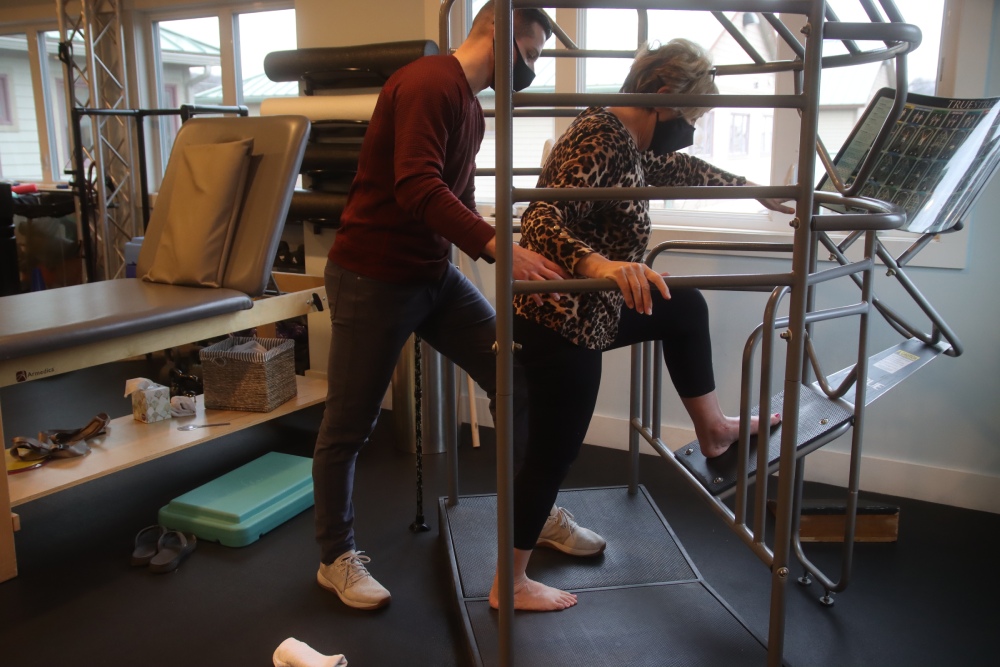- Traverse City, MI |
-
West: W Front St:
(231) 944-6541
-
| Central: Munson Ave :
(231) 421-9300


A Full Body Movement Assessment is a series of tests used to analyze an individual’s functional and fundamental movement patterns.
This type of evaluation is often performed to identify a person’s potential risk of sustaining a musculoskeletal disorder.
If you’re not sure what might be wrong with your knee, leg, shoulder, or hip, our self-tests can be instrumental in understanding the potential cause of pain and identifying the right remedies.
That being said, our self-tests are not intended to be a substitute for a professional diagnosis or medical advice. Always consult your physician first before starting a new healthcare regimen or treatment.
Knee pain affects people of all ages. It may be caused by an injury, such as a torn cartilage or damaged ligament. Medical conditions like gout, arthritis, and infection can also result in knee pain.
Our 30-second self-test for knee pain can help shed some light on where your knee pain is coming from. Once we’ve discovered the root source, our team can help you restore full function through physical therapy.
Sciatica is characterized by pain that radiates along the course of the sciatic nerve. It originates from the lower back and extends through the buttocks and hips and down the leg.
This condition is commonly caused by inflammation, irritation, pinching, or compression of a sciatic nerve. Try our 30-second self-test to check if you have sciatica. If your test generates positive results, physical therapy can help alleviate symptoms and restore normal function.
Are you over the age of 50? Do you have pain with standing do you have pain in your lower back with walking and does that pain go away when you sit down? If you answered "yes" research shows there's a 97% chance that you have stenosis in your spine.
Try our 30-second self-test to check if you have stenosis. If your test generates positive results, physical therapy can help alleviate symptoms and restore normal function.
Individuals who are struggling with Achilles tendonitis experience pain along the back of the leg near the heel. This condition is triggered by repetitive or intense strain on the band of tissue that connects the heel bone to the calf muscle.
If you’re experiencing symptoms of Achilles tendonitis, our self-test can help determine the cause of your pain and direct you toward the right interventions.
Your core muscles, including the abdominals, back muscles, and hip muscles are involved in the mobility and stability of the spine.
Core stability exercises must be performed in upright positions that look and feel like your everyday activities. By performing our core stability test, you can improve balance, reduce the risk of injury, and strengthen muscle functions.
Plantar fasciitis is a common cause of heel pain usually triggered by repetitive strain injury to the ligament of the sole. Strain injury can result from excessive walking or running, jumping and landing incorrectly, and improper footgear.
Our self-test can indicate plantar fasciitis, and you may start with the appropriate physical therapy.
A herniated or slipped disk in the spine can cause sharp or burning pain in the leg, arm, back, or neck. Depending on the location of the herniated disk, it can also result in weakness or numbness in the leg or arm.
Try our self-test to determine if your low back pain and sciatica are caused by a herniated disc.
Sacroiliac (SI) joint pain is felt in the buttocks and lower back. Our quick and easy self test can help you determine whether the SI joint is the source of pain.
Shoulder pain is commonly caused by injury or overuse. Try our self-test now and find out if your shoulder pain is caused by a rotator cuff tear, impingement syndrome, or simply a stiff shoulder blade.
Discover what is causing lower back pain during pregnancy using our quick self-test you can try at home.
Hip pain can be due to inflammatory or noninflammatory arthritis or caused by core muscle injuries. Try our quick self-test to determine what is causing your hip pain.
Also see this research study on how important regular check-ups are: What Do We Know About Healthy Aging? | National Institute on Aging (nih.gov)
We have online courses and a number of books about Pain Relief available for Free by Clicking Here.
Address your neck, back, arm, or leg pain with our full-body movement assessments. Dial 231.944.6541 or send an email to info@thesuperiortherapy.com to know the right treatment option for you.
